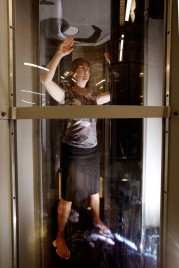Two months ago, Homeland Security Secretary Janet Napolitano announced that the federal stimulus legislation would pay for the purchase of hundreds of controversial full-body scanners.
“Through the Recovery Act, we are able to continue our accelerated deployment of enhanced technology as part of our layered approach to security at airports nationwide,” Napolitano said at the time.
Since then, the number of scanners has roughly doubled since Napolitano’s announcement and are now found in 68 U.S. airports, and the Transportation Security Administration says the controversial devices have proven to be a success.
“We have received minimal complaints,” a TSA spokeswoman told CNET yesterday. She said that the agency, part of DHS, keeps track of air traveler complaints and has not seen a significant rise.
A growing number of airline passengers, labor unions, and advocacy groups, however, say the new procedures–a choice of full-body scans or what the TSA delicately calls “enhanced patdowns”–go too far. (They were implemented without much fanfare in late October, amid lingering questions (PDF) about whether travelers are always offered a choice of manual screening.)
Unions representing U.S. Airways pilots, American Airlines pilots, and some flight attendants are advising their members to skip the full-body scans, even if it means that their genitals are touched. Air travelers are speaking out online, with a woman saying in a YouTube video her breasts were “twisted,” and ExpressJet pilot Michael Roberts emerging as an instant hero after he rejected both the body scanning and “enhanced patdowns” options and was unceremoniously ejected from the security line from Memphis International Airport.
One lawsuit has been filed and at least two more are being contemplated. There are snarky suggestions for what TSA actually stands for, attempts at grope-induced erotic fiction, and now even a movie.
These privacy concerns, and in a few cases even outright rebellion, come as an estimated 24 million travelers are expected to fly during the 2010 Thanksgiving holiday season. One Web site, OptOutDay.com, is recommending what might be called strict civil obedience: it suggests that all air travelers on November 24, the day before Thanksgiving, choose “to opt-out of the naked body scanner machines” that amount to “virtual strip searches.”
Normally, that kind of public outcry might be enough to spur TSA to back down–after all, in 2004 it relaxed its metal detector procedures to allow passengers a second try, and a year later it relaxed its rules to allow scissors in carry-on bags. Plus, the U.S. House of Representatives (but not the Senate) approved a bill saying that “whole-body imaging technology may not be used as the sole or primary method of screening a passenger.”
But with a lame duck Congress not even in session until next week, no hearings on full-body scanners currently scheduled, and renewed concerns about explosives in printer cartridges, an immediate reversal seems unlikely.
Instead, TSA is defending its practice. “TSA constantly evaluates and updates screening procedures to stay ahead of evolving threats, and we have done so several times already this year,” a spokeswoman said. “As such, TSA has implemented an enhanced pat down at security checkpoints as one of our many layers of security to keep the traveling public safe.”
“Administrator John Pistole is committed to intelligence-driven security measures, including advanced imaging technology and the pat down procedure and ordered a review of certain policies shortly after taking office to reinforce TSA’s risk-based approach to security,” TSA said. “We look forward to further discussion with pilots on these important issues.”
TSA’s official blogger, who uses the apparent pseudonym Blogger Bob, went so far as to say this week that: “There is no fondling, squeezing, groping, or any sort of sexual assault taking place at airports. You have a professional workforce carrying out procedures they were trained to perform to keep aviation security safe.”
Another possible catalyst for an eventual change in screening procedures is a lawsuit that the Electronic Privacy Information Center, a non-profit advocacy group, filed against the TSA and Homeland Security last week.
“The agency went off the rails in the spring of 2009 when it decided on its own authority to make body scanners the primary screening technique in the United States,” says Marc Rotenberg, EPIC’s executive director. “We think there had to be a public rulemaking. We think the conduct implicates freedom of religion. We think it implicates the Privacy Act.”
EPIC’s lawsuit is ambitious. It says that TSA should have conducted a formal, 90-day public rulemaking to “fully evaluate all privacy, security, and health risks” and wants the DC Circuit to require the agency to conduct one. In addition, making full-body scanners the primary method of screening violates the Fourth Amendment, the suit says, because the scans are “far more invasive than necessary.”
In September, the DC Circuit shot down EPIC’s initial request for an emergency halt, saying the standards for a preliminary injunction against TSA were not met. Rotenberg remains optimistic, saying “these are obligations that are written into federal law” that TSA must follow. (This time, EPIC is not asking for an emergency injunction.)
The ACLU says it’s also weighing a lawsuit but has not filed one so far.
TSA has “always done pat-downs,” but until recently they haven’t been so aggressive, says Chris Calabrese, legislative counsel at the ACLU in Washington, D.C. “The pat-downs never used to go up a woman’s skirt.”
“It’s become troubling,” Calabrese says. “You’ve got these controversial naked strip search machines that they’re rolling out at airports across America. And if you choose not to go through the naked strip search machine, you’re subject to this (level of intrusive physical contact). It seems punitive. It seems designed to drive you to the naked strip search machine.”
Body scanners penetrate clothing to provide a highly detailed image that TSA says is viewed by a remote technician. Technologies vary, with millimeter wave systems capturing fuzzier images with non-ionizing radio waves and backscatter X-ray machines able to show precise anatomical detail.
TSA says it does not store scans, and there is no evidence indicating the agency does at routine airport checkpoints.
But documents that EPIC obtained show the agency’s procurement specifications require that the machines be capable of storing the images on USB drives. A 70-page document (PDF), classified as “sensitive security information,” says that in a test mode the scanner must “allow exporting of image data in real time” and provide a mechanism for “high-speed transfer of image data” over the network.
Another federal agency, the Marshals Service, has acknowledged (PDF) that tens of thousands of images from a Brijot Gen2 machine were stored from just one courthouse checkpoint.
The Gen 2 machine, manufactured by Brijot of Lake Mary, Fla., uses a millimeter wave radiometer and accompanying video camera to store up to 40,000 images and records. Brijot boasts that it can be operated remotely: “The Gen 2 detection engine capability eliminates the need for constant user observation and local operation for effective monitoring. Using our APIs, instantly connect to your units from a remote location via the Brijot Client interface.”
Meanwhile, the backlash among air travelers will likely continue as more full-body scanners pop up in airports and more travelers are faced with the choice of intrusive scanning or an intrusive pat-down done with someone’s fingers instead of the back of a hand. Body scanners in the Orlando airport were turned on yesterday, for instance, and they’ve appeared at Dulles airport this week as well.
A flotilla of Web sites, including Nudeoscope.com, DontScan.us, and StopDigitalStripSearches.org is hoping to translate that dissatisfaction into political action. The Council on American-Islamic Relations sent out a travel advisory yesterday with special recommendations for Muslim women.
Another line of attack is health concerns: biochemistry faculty members at the University of California at San Francisco have written the White House saying the X-ray “dose to the skin may be dangerously high.” (A response co-authored by FDA and TSA officials dismissed any health risks as “miniscule.”)
“For some reason TSA is rushing these things out,” says Charlie Leocha of the Consumer Travel Alliance. “They haven’t fully studied them. They haven’t tested them. They don’t know if it’ll detect the explosives you’re looking for…We’re at a perfect storm, but will TSA listen to anyone? I don’t know.”
 0.04 (+0.1%)
0.04 (+0.1%)  -0.11 (-0.13%)
-0.11 (-0.13%) 


